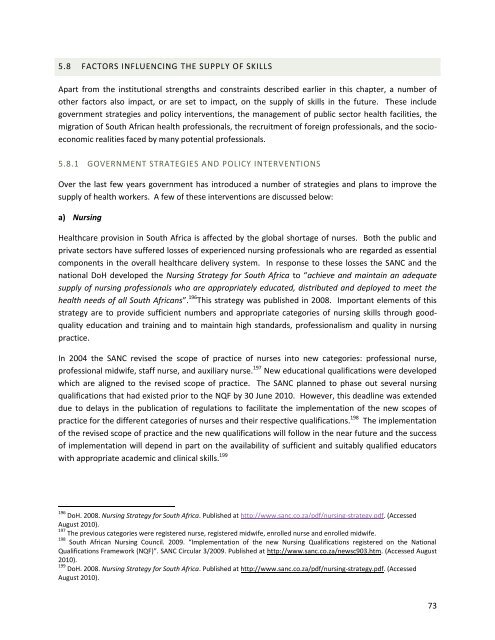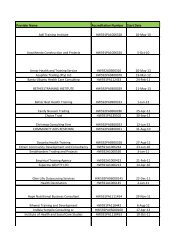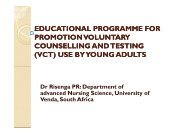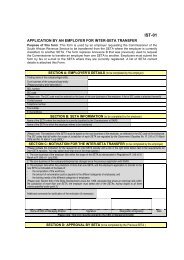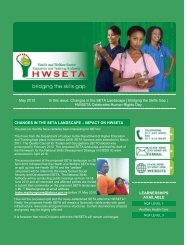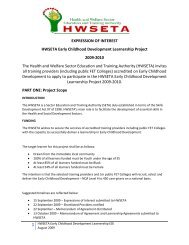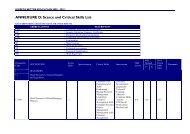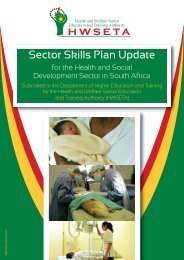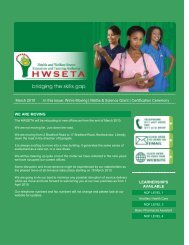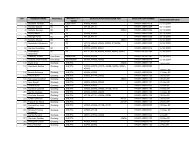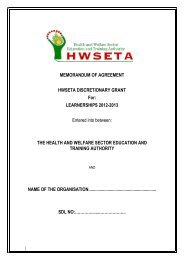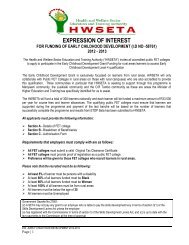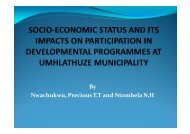sector skills plan for the health sector in south africa
sector skills plan for the health sector in south africa
sector skills plan for the health sector in south africa
You also want an ePaper? Increase the reach of your titles
YUMPU automatically turns print PDFs into web optimized ePapers that Google loves.
5.8 FACTORS INFLUENCING THE SUPPLY OF SKILLS<br />
Apart from <strong>the</strong> <strong>in</strong>stitutional strengths and constra<strong>in</strong>ts described earlier <strong>in</strong> this chapter, a number of<br />
o<strong>the</strong>r factors also impact, or are set to impact, on <strong>the</strong> supply of <strong>skills</strong> <strong>in</strong> <strong>the</strong> future. These <strong>in</strong>clude<br />
government strategies and policy <strong>in</strong>terventions, <strong>the</strong> management of public <strong>sector</strong> <strong>health</strong> facilities, <strong>the</strong><br />
migration of South African <strong>health</strong> professionals, <strong>the</strong> recruitment of <strong>for</strong>eign professionals, and <strong>the</strong> socioeconomic<br />
realities faced by many potential professionals.<br />
5.8.1 GOVERNMENT STRATEGIES AND POLICY INTERVENTIONS<br />
Over <strong>the</strong> last few years government has <strong>in</strong>troduced a number of strategies and <strong>plan</strong>s to improve <strong>the</strong><br />
supply of <strong>health</strong> workers. A few of <strong>the</strong>se <strong>in</strong>terventions are discussed below:<br />
a) Nurs<strong>in</strong>g<br />
Healthcare provision <strong>in</strong> South Africa is affected by <strong>the</strong> global shortage of nurses. Both <strong>the</strong> public and<br />
private <strong>sector</strong>s have suffered losses of experienced nurs<strong>in</strong>g professionals who are regarded as essential<br />
components <strong>in</strong> <strong>the</strong> overall <strong>health</strong>care delivery system. In response to <strong>the</strong>se losses <strong>the</strong> SANC and <strong>the</strong><br />
national DoH developed <strong>the</strong> Nurs<strong>in</strong>g Strategy <strong>for</strong> South Africa to “achieve and ma<strong>in</strong>ta<strong>in</strong> an adequate<br />
supply of nurs<strong>in</strong>g professionals who are appropriately educated, distributed and deployed to meet <strong>the</strong><br />
<strong>health</strong> needs of all South Africans”. 196 This strategy was published <strong>in</strong> 2008. Important elements of this<br />
strategy are to provide sufficient numbers and appropriate categories of nurs<strong>in</strong>g <strong>skills</strong> through goodquality<br />
education and tra<strong>in</strong><strong>in</strong>g and to ma<strong>in</strong>ta<strong>in</strong> high standards, professionalism and quality <strong>in</strong> nurs<strong>in</strong>g<br />
practice.<br />
In 2004 <strong>the</strong> SANC revised <strong>the</strong> scope of practice of nurses <strong>in</strong>to new categories: professional nurse,<br />
professional midwife, staff nurse, and auxiliary nurse. 197 New educational qualifications were developed<br />
which are aligned to <strong>the</strong> revised scope of practice. The SANC <strong>plan</strong>ned to phase out several nurs<strong>in</strong>g<br />
qualifications that had existed prior to <strong>the</strong> NQF by 30 June 2010. However, this deadl<strong>in</strong>e was extended<br />
due to delays <strong>in</strong> <strong>the</strong> publication of regulations to facilitate <strong>the</strong> implementation of <strong>the</strong> new scopes of<br />
practice <strong>for</strong> <strong>the</strong> different categories of nurses and <strong>the</strong>ir respective qualifications. 198 The implementation<br />
of <strong>the</strong> revised scope of practice and <strong>the</strong> new qualifications will follow <strong>in</strong> <strong>the</strong> near future and <strong>the</strong> success<br />
of implementation will depend <strong>in</strong> part on <strong>the</strong> availability of sufficient and suitably qualified educators<br />
with appropriate academic and cl<strong>in</strong>ical <strong>skills</strong>. 199<br />
196 DoH. 2008. Nurs<strong>in</strong>g Strategy <strong>for</strong> South Africa. Published at http://www.sanc.co.za/pdf/nurs<strong>in</strong>g-strategy.pdf. (Accessed<br />
August 2010).<br />
197 The previous categories were registered nurse, registered midwife, enrolled nurse and enrolled midwife.<br />
198 South African Nurs<strong>in</strong>g Council. 2009. “Implementation of <strong>the</strong> new Nurs<strong>in</strong>g Qualifications registered on <strong>the</strong> National<br />
Qualifications Framework (NQF)”. SANC Circular 3/2009. Published at http://www.sanc.co.za/newsc903.htm. (Accessed August<br />
2010).<br />
199 DoH. 2008. Nurs<strong>in</strong>g Strategy <strong>for</strong> South Africa. Published at http://www.sanc.co.za/pdf/nurs<strong>in</strong>g-strategy.pdf. (Accessed<br />
August 2010).<br />
73


